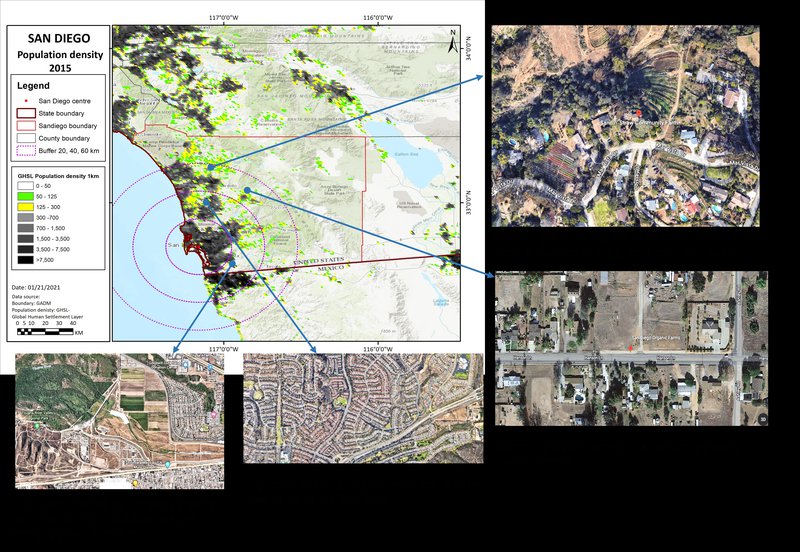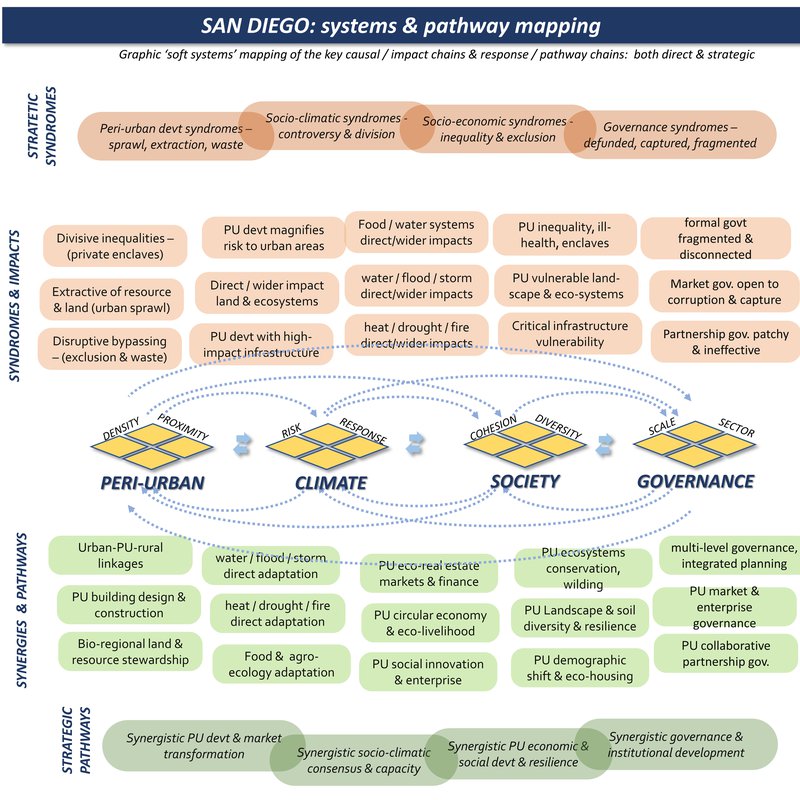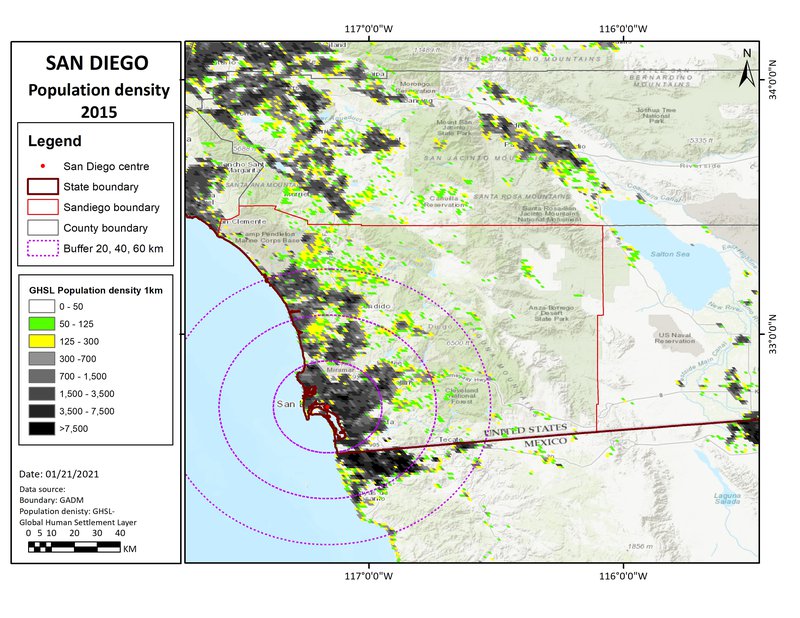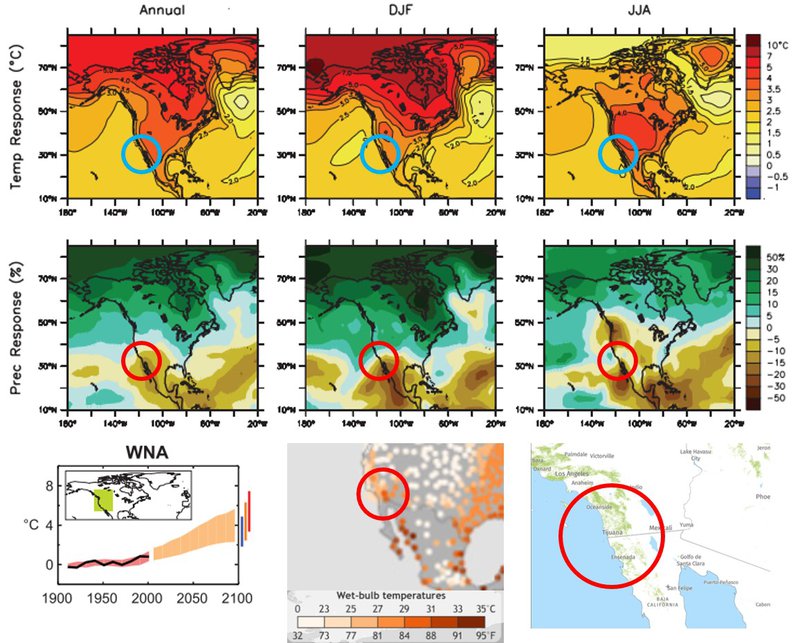San Diego region: location
San Diego region
(The map here shows circles of 20, 40 & 60km radius, a rough approximation to the gravity field).
San Diego: overview
San Diego is the high income side of the cross border conurbation of San Diego - Tijuana: intensive car-based urban form with slow growing peri-urban sprawl in the hinterland. Increasing vulnerability to water stress, heat, drought, desertification & rural depopulation.
Peri-urban syndromes: extensive suburban car-based urban form within large FUAs: recent peri-urban growth is more gradual due to stronger controls: demographic change with sub-division of larger peri-urban housing: hinterland is mountainous arid landscape with declining small towns & patchy infrastructure.
Climate change risks: in a fragile geography, already under pressure on a narrow coastal strip: increasing heat, drought & water stress is projected, with direct impacts on intensive agricultural production & hinterland landscape, with rapid loss of remaining tree cover. Occasional riverine & flash flooding, lacking water management.
Societal vulnerability: fragile landscapes vulnerable to drought, desertification & fires to N&S: high inequality & exclusion of working poor, migrants, displaced, homeless, excluded minorities of many kinds, with high levels of housing & financial stress, economic vulnerability in peri-urban / peri-rural settlements: all magnified by cross border effects.
Governance syndromes: mainly effective government with urban / transport / environment policy, & (limited) public services: hardly keeping pace with the dynamics of urbanization & real estate logic, with typical sectoral fragmentation & multi-level disconnection: active civil society groups are typically not connected to the system: peri-urban & climate awareness is high with policy still catching up:
Adaptive pathways: integrated bio-regional strategic planning (crossing the border zone): urban-rural linkages with agro-ecology & circular economy systems: integrated peri-urban design for climate-wise water / drought / heat resilience: potential for eco-real estate markets & climate-wise development patterns:
Adaptive governance: policy integration & capacity building for multi-level government: new role for civil society governance: potential for grassroots / social innovations.
San Diego: where is the peri-urban?

San Diego: system mapping

San Diego: summary data
Climate hazard
(World Bank data profile for San Diego)
Extreme heat - High
Wildfire - High
Water scarcity - Medium
River flood - Very low
Urban flood - Very low
Coastal flood - Medium
Cyclone - Low
Tsunami - High
Landslide - High
Earthquake - Medium
Volcano - Medium
Population density map
This shows three population density bands: 0-50, 50-125, and 125-300 persons/km2: (transparent for open land, and then green and yellow cells). These are in different proximities to the main urban centres, for the moment defined by distances (from the urban centre), of 0-20, 20-40, and 40-60km: titled 'near-urban', 'near-urban: further urban: and ex-urban / peri-rural'.

Climate projections: temperature effects
(Top & middle parts include):
- temperature uplift and precipitation uplift, projected with the central ‘A1B’ scenario, for 2080-2100. Source: IPCC - AR4 - WG1 - Chapter 11-1 - https://www.ipcc.ch/site/assets/uploads/2018/02/ar4-wg1-chapter11-1.pdf
(Lower part includes):
- Comparison of projected temperature rise under B1, A1B, A2 emissions scenarios: Source - IPCC - AR4 - WG1 - Chapter 11-1
- Peak wet bulb temperatures 1979-2017: (note TW of 30-350 can be lethal). Source : https://research.noaa.gov/article/ArtMID/587/ArticleID/2621/Dangerous-humid-heat-extremes-occurring-decades-before-expected
- Fire (2020 summer period) & forest cover maps (>30% canopy cover): Source https://www.globalforestwatch.org

